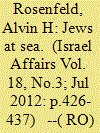| Srl | Item |
| 1 |
ID:
113994


|
|
|
|
|
| Publication |
2012.
|
| Summary/Abstract |
The involvement of Jews in the much-publicized May 2010 Mavi Marmara incident at sea, is but one instance of many that illustrates Jewish collusion with Israel's detractors and defamers. While their numbers remain relatively small, the impact of such Jews in fostering a public rhetoric of anti-Israel vilification is growing and needs to be taken seriously. The current propaganda war against the Jewish state is, among other things, a language war, and close scrutiny of today's anti-Zionist discourse is essential.
|
|
|
|
|
|
|
|
|
|
|
|
|
|
|
|
| 2 |
ID:
168594


|
|
|
|
|
| Summary/Abstract |
Most IR scholars attribute changes in foreign-policy strategic planning to shifts in interests, capabilities, alliances, norms, knowledge, and context. Even those studies focusing on social learning as a driver for policy change mostly underestimate the role of international legitimacy dynamics in influencing learning processes. This paper seeks to bridge the gap between theory and practice by building on David Ausubel's theory of meaningful learning to address the Gaza Flotilla crisis as a paradigmatic case of legitimacy learning. This tragic incident, which occurred in May 2010, deepened the diplomatic crisis between Israel and Turkey, until their official reconciliation in June 2016. Likewise, it led to growing delegitimization of Israel among several global audiences. Having internalized the magnitude of the political damage that this incident caused and the need to subordinate operational decisions to legitimation considerations, Israel sought to tackle similar future challenges through reforms in numerous issue-areas relating to foreign-policy strategic planning: diplomatic, military, communications, intelligence, technological, and humanitarian. Drawing on testimonies of Israeli policymakers and the reports published by committees appointed to examine the flotilla events, this phenomenological study describes Israel's meaningful learning process, tracing the subsequent development of delegitimatzia (“delegitimation”) as an advance organizer among Israeli governmental and nongovernmental institutions. These findings can serve scholars in outlining a broader research agenda for analyzing how different actors adapt to the battles for legitimacy that characterize contemporary global politics.
|
|
|
|
|
|
|
|
|
|
|
|
|
|
|
|